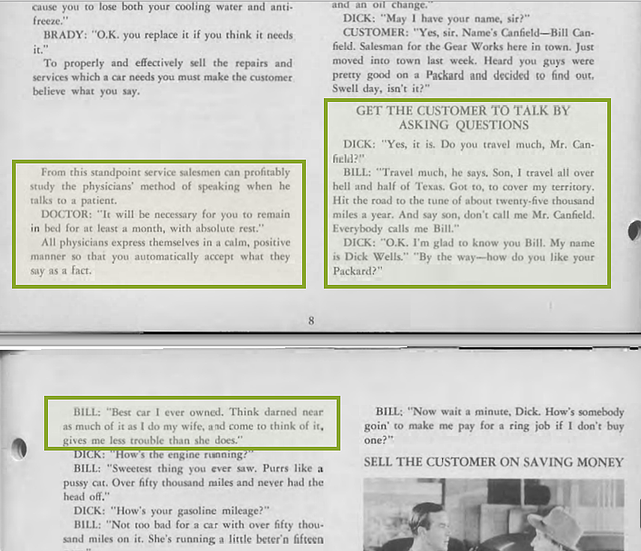Last year, when Gizmodo released a copy of Apple’s Genius Bar training manual, there was much talk that the company was educating Geniuses to engage in a type of psychological manipulation. Why were so many people distressed by these sales and marketing techniques? Using these techniques to “frame” the customer experience is hardly a new concept. Maybe it was because Apple’s product and service offerings are so strong and so beloved, some people forgot that the Apple Store is just that, a store, where things are bought and sold.
This led me to wonder about how such training approaches have changed over the years –after all we’re so much more highly evolved nowadays, right? Ha! Enter the 1950 Packard Service Management Training Manual. Obvious cultural tags of the times aside (“That’s a swell idea.”), there’s almost nothing Apple purportedly tells Geniuses to do that Packard didn’t tell its employees 60+ years ago!
Take this line: “Although the merchandise and services we have to offer consists of: parts, accessories, lubrication and service labor, they are not the items the owner is buying. The owner wants to buy results. So, let’s sell him results such as: economy, safety, performance, comfort, convenience, and pride of ownership.”
Translated to a modern day perspective with a swap of only a few words: “Although the merchandise and services we have to offer consist of: [smartphones, MP3 players], accessories, and service, they are not the items the owner is buying. The owner wants to buy results. So, let’s sell [her] results such as: performance, convenience, and pride of ownership.” This could be Apple, or many other consumer-oriented service companies.
A hilarious 1950-style exchange…

This brings me full circle to 2013 and Amazon’s Vine reviewer program—a program which provides an elite group of customers products to review, and often to keep. The program has drawn a bit of attention lately, including a recent NPR piece. Some commenters are ambivalent, and a good number take a strong position that this is manipulative or biased (even if they sometimes sound envious), and a few defend it. In 1950, Packard reps were told to focus on their town doctors, and the logic holds up—doctors needed their cars to make house calls, they were highly respected community members and, guess what, they were the ones with money to buy new Packards! Was this strategic or manipulative? Or did it just feed off of basic human nature, for better or worse?
Speaking of worse, one thing that has changed across the decades is that individual sales and marketers aren’t allowed to take responsibility for, or acknowledge mistakes directly. As a Packard rep in 1950 you were encouraged to take responsibility for errors, omissions, or other flaws by directly addressing them with the customer. Nowadays legal compliance departments appear to have outlawed use of any terms that imply responsibility.
So what’s a marketer to do? How to be honest while simultaneously “framing” your product/service strategically? Well, it helps to start with a solid offering (yes, I am a fan of Apple). If your product doesn’t meet the basic promises, don’t expect to build success on that with brilliant service—it won’t ring true. Measure the connection of what you promise and what customers perceive so that you can focus on what matters.
We help clients do this every day with customer studies—call them voice of the customer, customer experience, customer satisfaction, even call them customer journey mapping or NPS. Our focus is on providing the insights from customers that will answer business questions like: What motivates customers to advocate our brand/product and how can we drive more of it? Or, Where are customers getting “stuck” in their “journey” with us and how do we remove barriers to repeat purchase?
But sadly, none of this work is of much use other than for a self-satisfied pat on the back if employees are telling customers to give a high score, instead of just earning it and allowing the process to work to get the real feedback for change. I cringe when staff say things like, “You will be getting a survey and we must get all 10s or I will (fill in the blank: be fired, lose a bonus, etc.).” They are seriously undermining the premise that this research is being done to learn what to improve and make better customer experiences. And even if I loved the service, I will then often not want to complete the survey.
To that end, kudos to Jiffy Lube, for whom I recently took a post-service satisfaction study where they explicitly asked if their rep had told me to give a good score. Probably as a research geek I noticed this in a way that the average person would not. Nevertheless, it was refreshing! It allowed me to give true customer feedback and feel confident the company really wanted to know what I thought, not just check a box, so they could make it better for the next person. Satisfying as a customer and as a researcher.

